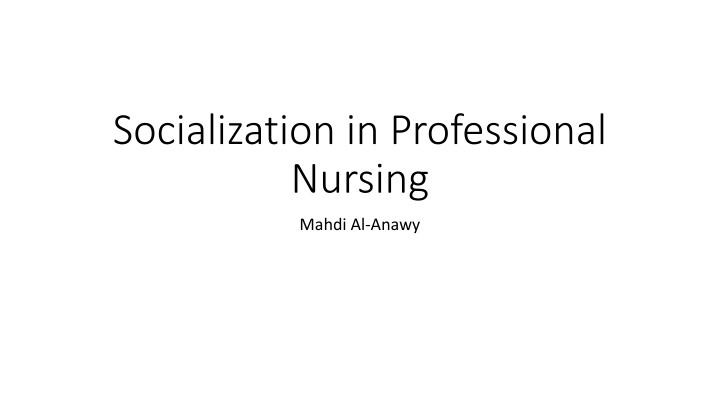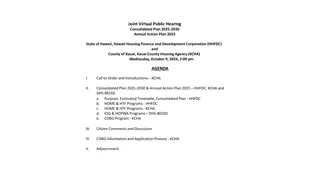
Socialization in Professional Nursing: Phases, Challenges, and Associations
Explore the phases of socialization in professional nursing, including anticipatory, formal, informal, and continuing stages. Learn about the challenges faced during socialization, such as role ambiguity, reality shock, workplace challenges, and cultural diversity. Discover the role of professional associations in supporting nurse integration and growth within the profession.
Download Presentation

Please find below an Image/Link to download the presentation.
The content on the website is provided AS IS for your information and personal use only. It may not be sold, licensed, or shared on other websites without obtaining consent from the author. If you encounter any issues during the download, it is possible that the publisher has removed the file from their server.
You are allowed to download the files provided on this website for personal or commercial use, subject to the condition that they are used lawfully. All files are the property of their respective owners.
The content on the website is provided AS IS for your information and personal use only. It may not be sold, licensed, or shared on other websites without obtaining consent from the author.
E N D
Presentation Transcript
Socialization in Professional Nursing Mahdi Al-Anawy
1. Socialization in Nursing 1. Socialization in Nursing Socialization in nursing refers to the process by which individuals acquire the knowledge, skills, values, attitudes, and norms necessary to perform as professional nurses. It helps shape their identity within the profession.
Phases of Socialization: 1.Anticipatory Socialization: Occurs before entering the nursing profession. Involves forming expectations about nursing through education, media, or personal experiences. 2.Formal Socialization: Happens during nursing education. Learning theoretical knowledge, clinical skills, and professional values. 3.Informal Socialization: Involves learning through experiences, role modeling, and interaction with peers, mentors, and patients.
4.Continuing Socialization: Ongoing throughout a nurse's career. Adapting to new roles, technologies, and environments. Goals of Socialization: Internalize professional values such as empathy, integrity, and accountability. Transition from layperson to a confident, competent nursing professional. Develop a professional identity and ethical decision-making skills.
2. Issues in Socialization 2. Issues in Socialization Socialization in nursing can be challenging due to various factors: Role Ambiguity: Confusion about professional roles and expectations, especially during transitions (e.g., student to licensed nurse). Reality Shock: A disconnect between nursing education and real-world clinical practice. Can lead to frustration, burnout, or dissatisfaction. Conflict with Personal Values: Nurses may struggle to reconcile personal values with professional expectations, especially in situations involving ethical dilemmas.
Workplace Challenges: High stress, heavy workloads, or difficult team dynamics can hinder socialization. Cultural Diversity: Nurses must navigate diverse work environments and patients cultural needs, which can be unfamiliar. Generational Differences: Varying attitudes and communication styles between new and experienced nurses can create barriers.
3. Professional Associations in Nursing 3. Professional Associations in Nursing Professional associations play a crucial role in the socialization of nurses, supporting their growth and integration into the profession. What are Professional Associations? Organizations dedicated to advancing the interests of the nursing profession and ensuring high standards of practice. Roles of Professional Associations: Education and Training: Provide continuing education opportunities, certifications, and resources for professional development. Networking Opportunities: Facilitate connections with peers, mentors, and experts in the field.
Advocacy: Represent the interests of nurses at local, national, and international levels. Promote healthcare policies that benefit patients and nurses. Standard Setting: Define and uphold professional codes of ethics, practice standards, and guidelines. Research Promotion: Encourage evidence-based practice by supporting nursing research and sharing findings.
Examples of Nursing Professional Associations: American Nurses Association (ANA): Advocates for nurses' rights and provides resources for professional growth. International Council of Nurses (ICN): Represents nurses globally, focusing on healthcare advocacy and policy development. Specialized Associations: Examples: Emergency Nurses Association (ENA), Association of Women's Health, Obstetric and Neonatal Nurses (AWHONN).
Summary Summary Socialization is a dynamic process essential to becoming a professional nurse, encompassing education, mentorship, and adaptation to various challenges. Issues in socialization such as role ambiguity, reality shock, and workplace diversity highlight the need for supportive systems. Professional associations serve as critical resources, helping nurses stay educated, connected, and empowered to navigate the evolving healthcare landscape. Encouraging active participation in professional organizations and ongoing learning will foster strong professional identities and resilience in the nursing workforce.
Any question ? Any question ?


















